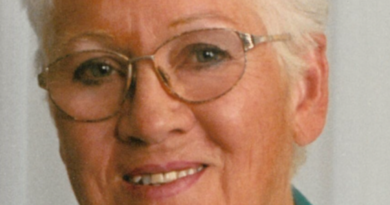Faith an Antidote
Burned out from Lingering Pandemic, some on Frontlines find Faith an Antidote
Provided by Joshua Caleb Johnson
While the devastation of a global pandemic has touched most people’s lives, the pressures faced by frontline healthcare workers have been unique and immense. The vaccines have dampened the impact of the overall threat, but the heightened anxiety for many frontline workers has remained. The rapid increase of cases day-by-day, the shortage of medical personnel and the emergence of new variants have culminated in a heavy burden on many medical professionals.
Hannah Hendershott started working as a registered nurse in Livingston County, New York fresh out of nursing school just six months before the initial influx of COVID-19 patients. She experienced a steep learning curve as waves of patients strained the slowly dwindling staff. “Trying to give people the care they need with less supplies, less staff and less resources created a lot of anxiety,” Hendershott said.
“There were definitely days when I wanted to quit and not have to deal with it anymore, but then you remember that these people are still going to be coming, and someone has to take care of them.”
 Jehovah’s Witnesses working on the frontlines of the COVID-19 crisis, such as Hendershott, were not immune to the mental distress; however, many found their faith proved to be a powerful means of coping.
Jehovah’s Witnesses working on the frontlines of the COVID-19 crisis, such as Hendershott, were not immune to the mental distress; however, many found their faith proved to be a powerful means of coping.
Mahala Guerrier, a nurse practitioner in Boston, Massachusetts, took what she described as “hypervigilant” precautions to protect her family from contracting COVID-19. Despite her best efforts, she still caught the disease. Then her husband tested positive, and her infant son and elderly parents all showed symptoms.
For Guerrier, the mental anguish and worry for her family’s well-being were more devastating than the virus’s physical effects. “What was really debilitating for me,” said Guerrier, “what really burdened my sickness and exacerbated it, was my anxiety.” Prayer and reading the Bible proved to be an anchor for her. “When I was afraid and my heart was pounding, I would just pray to God. And I would read the Bible. And after praying, I could feel my heart having calmness and peace of mind.”
She also compiled a list of scriptures she would constantly refer to. “As a nurse, we tell our patients who are suffering from painful illnesses to take pain medication every four to six hours,” she said. “That way they keep their pain under control and at a tolerable level. The scriptures were my pain medication. When I read them every couple of hours, that’s what soothed me. They were my relief.”
American psychological and psychiatric associations, while not advocating or endorsing any specific religion, acknowledge the role spirituality and religious faith can play in coping with distress and trauma.
Lawrence Onoda, Ph.D., a clinical psychologist in Mission Hills, California, noted some ways spirituality can help, including giving people “a positive hope and meaning toward life, comfort by looking for answers and strength from a higher power, and a collective shared experience of support and community.”
Hendershott focused on her relationship with God to alleviate the turmoil that surrounded her at work. She reserved time in her schedule for Bible study with her congregation and wrote letters with encouraging thoughts from the Bible to share with others.
study with her congregation and wrote letters with encouraging thoughts from the Bible to share with others.
One favorite resource for her has been jw.org, the official website of Jehovah’s Witnesses, with its collection of practical articles like “How to Beat Pandemic Fatigue” and short comforting videos such as “The Resurrection – Soon a Reality.” Hendershott said she enjoyed some of the experiences on jw.org of others who were coping with challenges similar to hers.
“It’s nice to have the reassurance of others around the world who are dealing with all these stresses, doing their best to get through their day with a smile,” she said. “That is really reassuring.”
About the image of Hannah Hendershott, a registered nurse in Livingston County, N.Y., refers to the Bible regularly as a source of encouragement to build her faith in God and cope with stress during the pandemic. – PHOTOS COURTESY OF JEHOVAH’S WITNESSES
For More Information Read: How to Beat Pandemic Fatigue
https://www.jw.org/en/bible-teachings/peace-happiness/physical-mental-health/pandemic-fatigue/
Watch: The Resurrection – Soon a Reality

https://www.jw.org/en/library/videos/#en/mediaitems/VODBibleTeachings/pub-jwbcov_201405_5_VIDEO
About JW.ORG
JW.ORG® presents the worldwide scope of the Witnesses’ outreach programs and provides articles, videos and interactive features for families, teens and children in over 1,000 languages.
Jehovah’s Witnesses come from hundreds of ethnic and language backgrounds, yet we are united by common goals. Above all, we want to honor Jehovah, the God of the Bible. We do our best to imitate Jesus Christ and are proud to be called Christians. Each of us regularly spends time helping people learn about the Bible and God’s Kingdom. Because we witness, or talk, about Jehovah God and his Kingdom, we are known as Jehovah’s Witnesses. To read the Bible online and learn more about us and our beliefs visit jw.org.
Public Information
900 Red Mills Road, Wallkill, NY, 12589
(718) 560-5600 | pid.us@jw.org
Press Contact: Daniel Sideris | dasideris@jw.org


